Project Gigabit progress update September 2023
Published 20 September 2023

Foreword
Back when I became the UK’s first Science, Innovation and Technology Secretary, I said that I have a key mission: to unlock the potential of technology to supercharge growth, delivering prosperity, security and opportunities for communities in every corner of the country.
This government is driving us forward into a new era of growth, fuelled by the digital economy and technologies of the future – from agricultural tech to educational tech, self-driving cars to an AI-powered NHS. But although these innovative new technologies are just around the corner, we cannot expect to realise their full potential unless everyone, regardless of where they live, can share in the benefits.
This latest BDUK progress update is published as the Connected Britain 2023 Conference in London gets underway. It is the major industry event of the year for those working in, and passionate about, telecoms and connectivity. As such, it provides us with an excellent opportunity to take stock, not just of the previous three months as detailed in this report, but of our progress since we launched Project Gigabit in 2021.
The government continues to hold BDUK to the highest standards, pushing them to deliver for the British people. I am pleased to say that BDUK continues to match our ambition and deliver on its core mission, helping to bring fast and reliable broadband and mobile coverage to hard-to-reach places across the UK. We are transforming people’s lives. Project Gigabit, a programme key to the government’s growth and levelling-up agendas, is going from strength to strength.
As this report demonstrates, we have now made more than £2 billion available to broadband suppliers to roll out lightning-fast gigabit-capable broadband in rural places across England and Wales. Indeed, a major milestone recently achieved is that all of the procurements currently planned for England have now been launched - a terrific achievement. We have also set out our plans in Wales and continue to work closely with our counterparts in Scotland, where the Public Review of broadband infrastructure is now complete. Such progress could not have been achieved without the excellent collaborative work I am proud to witness every day.
It is also an extraordinary feat that 100,000 vouchers have now been used to connect homes and businesses across the UK . Each one of those vouchers represents a transformation in someone’s life or business. Later in this report you will read about Ingram Farm, situated in the Northumberland National Park and which, with the advantages of gigabit-capability, has revolutionised its agricultural record keeping and diversified into tourism. The farm is now fit for the future with connectivity that will help their brilliant business continue to grow.

In July, the Minister for Data and Digital Infrastructure, Sir John Whittingdale, visited the beautiful seaside community of Orford in Suffolk together with Thérèse Coffey, the Secretary of State for Environment, Food and Rural Affairs, to announce the signing of three Project Gigabit contracts. Up to 218,000 rural homes and businesses across Norfolk, Suffolk and Hampshire are in line to receive an upgraded broadband connection thanks to £318 million of UK government funding. The successful supplier, CityFibre, is in turn investing some £170 million of private funds, and with survey work now underway this £488 million plan is set to transform digital connectivity for rural homes and businesses across all three counties.
Minister Whittingdale was able to see for himself the proposals and gain an on-the-ground understanding of the transformational difference these gigabit connections will make. The visit came as we learned that gigabit coverage across the UK now tops 77% - up from just 6% at the start of 2019. It is a remarkable improvement in such a short space of time.

Earlier this month, BDUK also shone a light on more on-the-ground evidence of Project Gigabit’s progress, with the news that a first cohort of apprentices in Cumbria is in training for telecoms jobs for the future, following the award of a Project Gigabit contract for the county at the end of last year.
It is a huge boost for jobs and skills across the North West of England. Broadband supplier Fibrus has committed to creating at least 90 apprenticeships covering a range of roles from underground and overhead cabling to surveying. Now, eight young local people have commenced their apprenticeships at the brand new learning facility in Newton Rigg, Penrith and this autumn the trainees will acquire formal telecoms qualifications necessary to commence long-term careers in the industry. Upon completion all will be offered permanent employment opportunities.
The story of Penrith is an excellent example of the difference BDUK’s work is making. It is not just about public procurements, contract awards and survey work, vital work though that is. Fibre is being installed in rural locations all across the country and people’s lives are being transformed, whether in terms of lightning-fast connectivity or job and training prospects.
We can reflect with pride on progress made. But I know there is plenty more hard work to do for the remainder of 2023, with multiple contracts in the pipeline and installation work progressing from Cornwall to Teesdale. There is no time to rest on our laurels - in many ways, the hard work is still to come.
Rt Hon Michelle Donelan MP Secretary of State for the Department for Science, Innovation and Technology
Summary
Project Gigabit is continuing to make good progress. The first premises have been connected under our Project Gigabit contracts, and we have now launched all of our currently planned procurements in England. We have a total of 27 live procurements, covering a total of over 780,000 premises. Combined with the existing 12 live contracts, this represents over £2 billion of investment to support the deployment of gigabit-capable broadband to over 1.1 million premises in hard-to-reach areas across the UK.
Since our last progress update in June 2023 we have:
- launched a further nine new local and regional procurements, with a combined indicative value of £597 million, to cover up to 260,000 more premises. This includes two cross-regional contracts that will target some of what is deemed under Project Gigabit to be the hardest to reach areas
- reached the milestone of the 100,000th voucher used to connect premises to gigabit-capable broadband
- published a Voucher evaluation report, which highlights how our Gigabit Vouchers have improved access to gigabit-capable connectivity for homes and businesses
- welcomed Dean Creamer as our new Chief Executive and Senior Responsible Officer for Project Gigabit
- published our latest evaluation report of the Superfast Programme which found that by September 2021, the programme had helped upgrade up to 300,000 additional premises to gigabit-capable broadband - connections that would not have happened without the Government intervening
ThinkBroadband reports that 77% of UK premises are now able to access a gigabit-capable connection.

Progress towards a gigabit UK
This section outlines the level of gigabit-capable coverage across the devolved nations and regions, in urban and rural areas, by supplier and by residential and business premises.
The latest data from Ofcom’s Summer 2023 Connected Nations Update shows the UK is continuing to make progress in expanding gigabit-capable broadband to premises across the country. In the period between January 2023 and May 2023, the most significant growth was in Wales where total coverage for residential and business premises rose by four percentage points. In Scotland and England gigabit-capable connectivity grew by 68% and 75% respectively.
Whilst gigabit-capable broadband covers a greater percent of urban UK premises due to the high density and more favourable deployment environments of towns and cities, rural areas are making positive progress. The biggest increase was seen in Northern Ireland with coverage in rural areas rising by four percentage points.
The progress of urban deployment in Wales, which started from a lower base, has been particularly noteworthy in the last three months with gigabit-capable broadband coverage rising from 61% to 65%. In England and Scotland, which enjoy higher levels of urban connectivity, progress was more moderate, while in Northern Ireland gigabit-capable broadband is now available to 95% of urban premises.
The information we outline is based on two broadband coverage data sources:
- independent website ThinkBroadband.com, which provides the most up-to-date information on national coverage, and is used to provide national and regional coverage statistics. This was sourced in September 2023 and represents the latest coverage snapshot up to that date
- Ofcom data collected in May 2023 for its Connected Nations Summer Update 2023 report, which is the most up-to-date source of coverage broken down by residential and business premises, as well as rural and urban premises
- the graph below shows how gigabit coverage has increased since July 2018, and how this tracks against our forecast trajectory, combining BDUK and commercial delivery, towards our coverage target
The UK gigabit-capable coverage trajectory chart outlines our progress towards our goal of 85% of the UK having access to gigabit-capable speeds by 2025.
UK gigabit-capable coverage trajectory (Source: DSIT analysis, ThinkBroadband. Data is accurate as of 7 September 2023.)
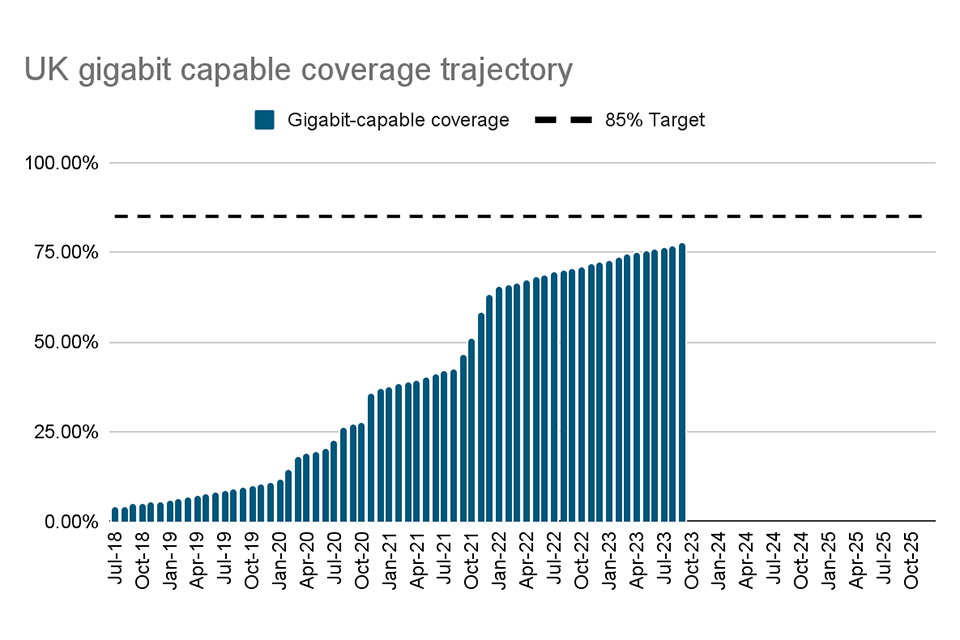
Combined commercial and residential gigabit-capable coverage across the devolved nations (Source: ThinkBroadband, May 2023) and broken down by rurality and type of infrastructure (Source: Ofcom, Connected Nations Report Update, September 2023. Data accurate as of May 2023.)
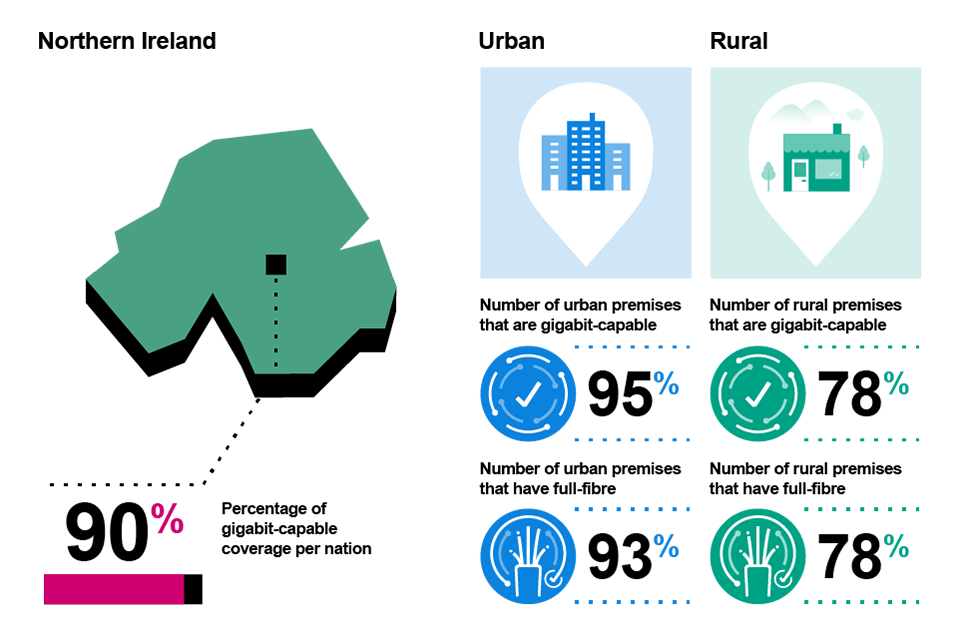
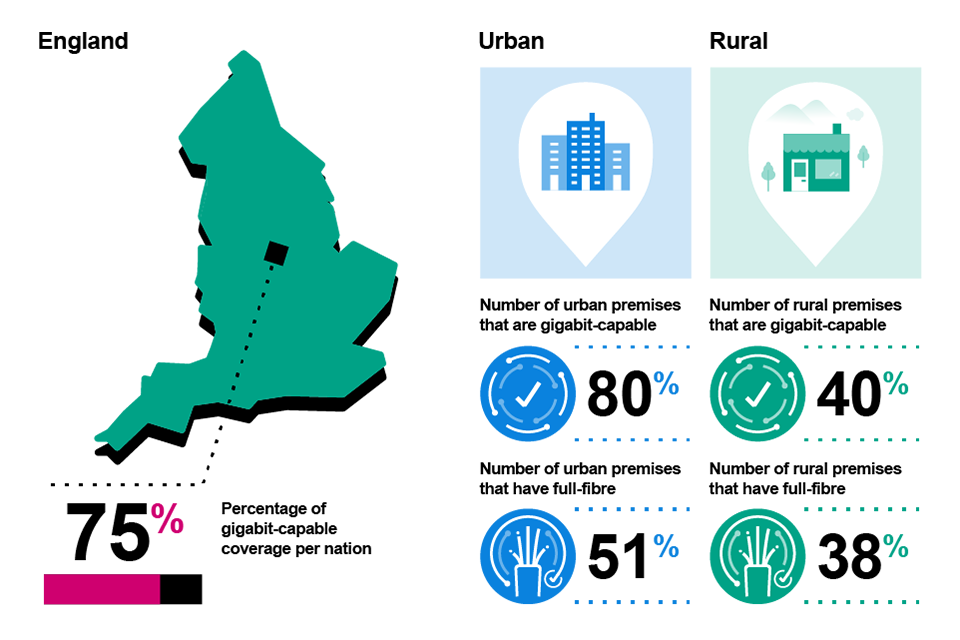
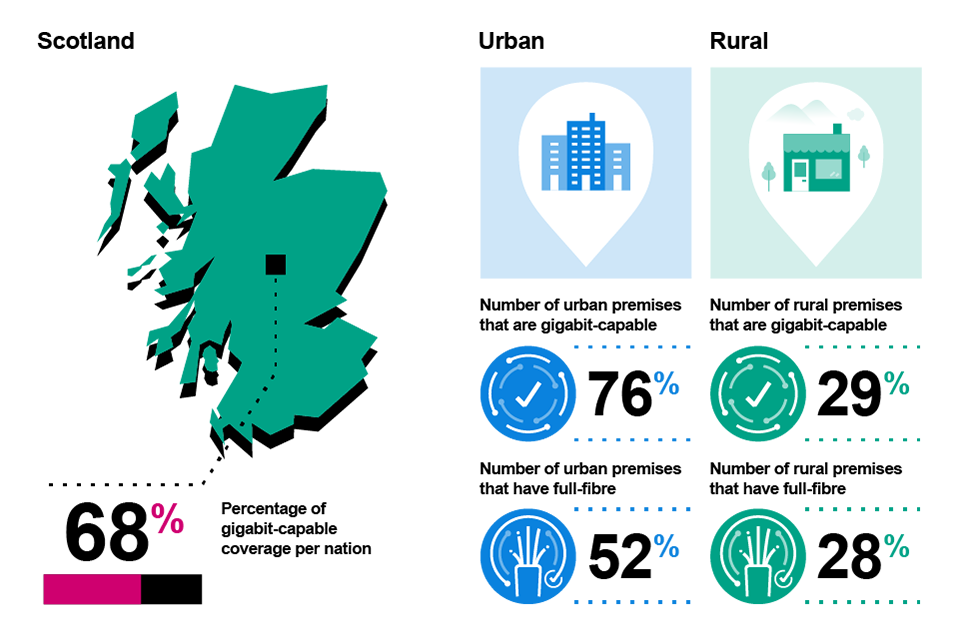
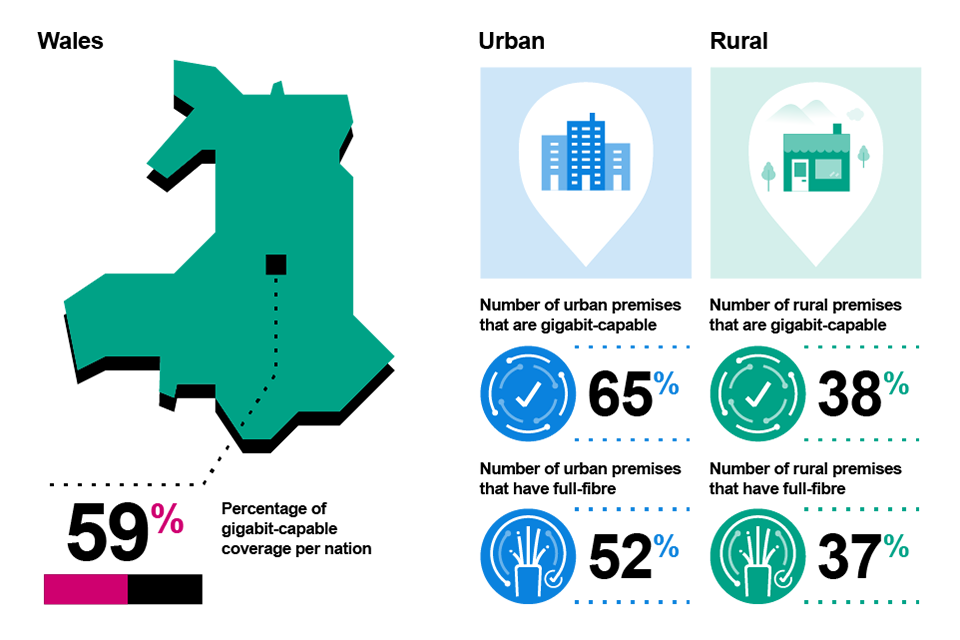
In the latest coverage data from ThinkBroadband, some regions and devolved nations show a growth in coverage of less than 1% between May 2023 and August 2023. These figures reflect refinements in Thinkbroadband’s methodology for tracking coverage, and do not affect overall UK figures. Consequently, the figures should be understood as an adjusted baseline rather than as an indicator of a significant change in deployment speed.
Gigabit-capable coverage by region and devolved nation, previous 12 months growth (Source: ThinkBroadband, September 2023)
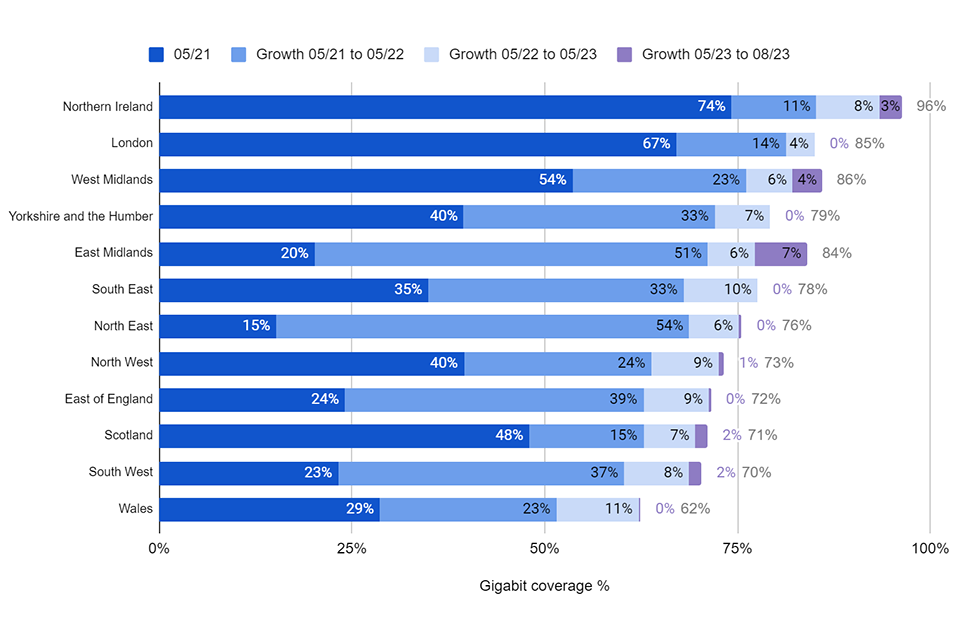
In May 2023 (the latest date for which this information was collected by Ofcom), 51% of business premises had access to gigabit-capable broadband. This comprises 28% of business premises coverage in rural areas and 55% in urban areas.
Gigabit-capable coverage by business premises - (Source: Ofcom, Connected Nations Report Update, September 2023. Data accurate as of May 2023)
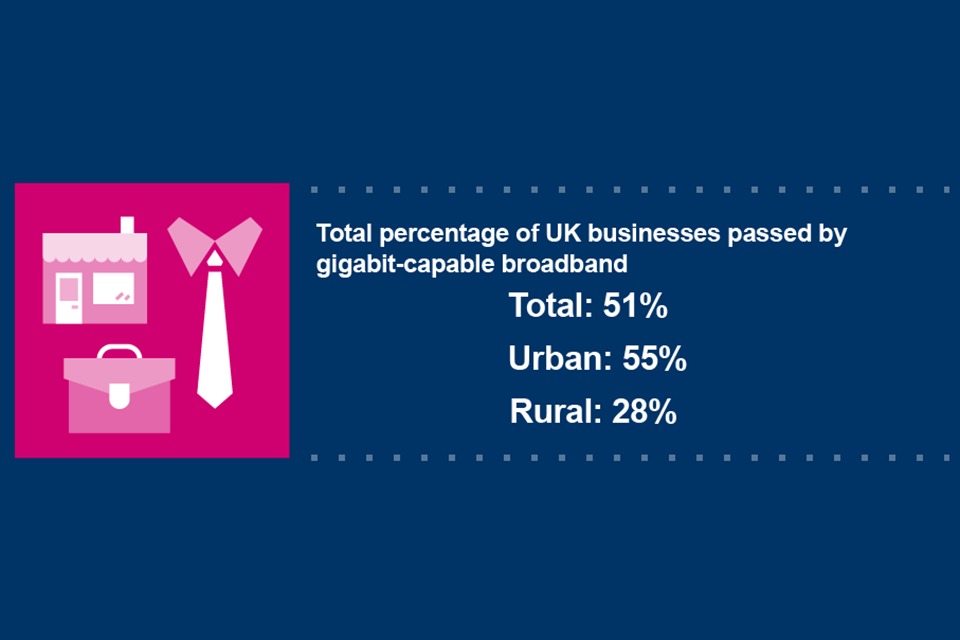
Update on Project Gigabit Delivery Plans
Project Gigabit Procurements
We have now launched all of our currently planned pipeline of local and regional procurements that form part of our delivery in England. Our latest procurements launched cover North Yorkshire, Cheshire, Lincolnshire and East Riding, West Herefordshire and Forest of Dean, East Gloucestershire, the Peak District, and Mid/East Devon and West Somerset.
In July, we launched our cross-regional procurement framework, designed to cover areas where regional or local procurements are less likely to be an appropriate route, and invited responses from suppliers to deliver two contracts under the framework. The first contract is for premises in West Berkshire, West and Mid Surrey, North Wiltshire and South Gloucestershire, Hertfordshire, Staffordshire and Lancashire. The second covers the North West, Mid and South East Wales and West and North Devon. The framework also enables us to procure further contracts in the future, to deliver coverage in other areas where this is likely to be the most appropriate procurement approach.
The North East procurement remains at contract award stage and we are currently working on the finalisation of the contract. Subject to supplier responses, we anticipate being able to award contracts for the following areas before the end of the year: Mid-West Shropshire, South and North Oxfordshire, Kent, East and West Sussex, Buckinghamshire, (part of) Hertfordshire and East of Berkshire, Derbyshire, South Wiltshire, Leicestershire and Warwickshire, North East Staffordshire and Worcestershire.
The responses to the last National Rolling Open Market Review (NR OMR), which ran from 19 May to 20 June, have been evaluated and assured. The supplier response to the NR OMR has increased each time we have run it and this time we received responses from 58 suppliers, 10 more than the January 2023 collection. The September NR OMR launched on 15 September.
Project Gigabit Procurement Progress (Source: BDUK. Data is accurate as of 11 September 2023.)
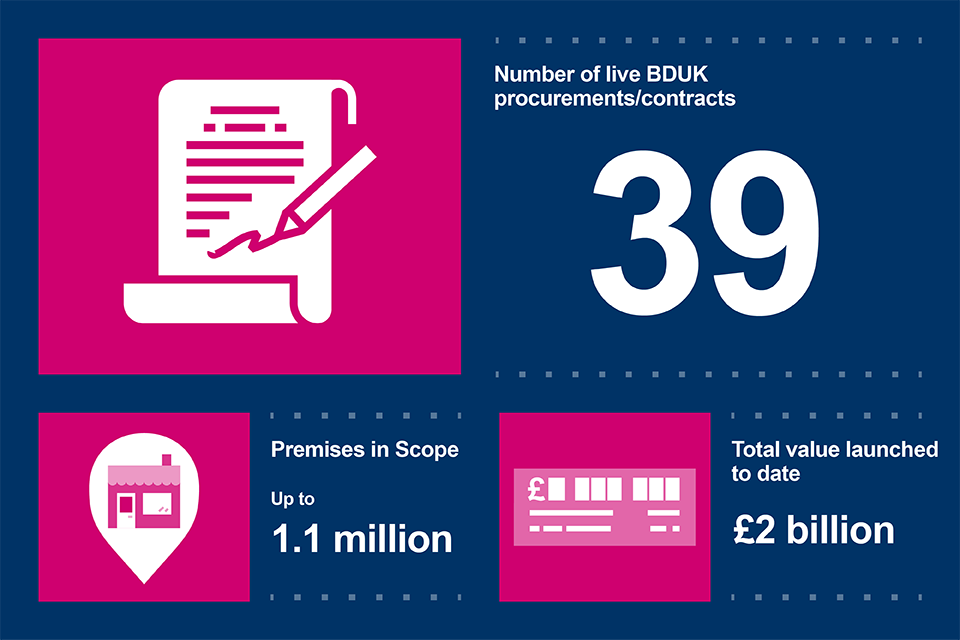
Project Gigabit Intervention Areas Map

Gigabit Vouchers
The impact of the Gigabit Broadband Voucher Scheme continues to grow with over 100,000 vouchers now claimed and used to connect residential and business premises with gigabit-capable speeds. Over 120,000 vouchers have been issued to date through the scheme and its previous iterations, and suppliers continue to identify projects to connect premises in eligible areas.
This month we also published our latest Gigabit Vouchers Evaluation Report showing how effective vouchers have been at stimulating gigabit-capable broadband rollout and driving positive impacts on local economies and communities. Our robust methodology included the use of rigorous “counterfactual” methods to ensure that any improvements we observed can be attributed to vouchers and are unlikely to have happened without public intervention.
The report, which examined all vouchers issued and connected by March 2021, has found clear evidence that their use helped boost the average download speed in local areas beyond what the market could have achieved alone. This effect becomes more pronounced for premises in more rural areas. In addition, a survey of 4,000 households who received a voucher in this timeframe found 53% of residents reported that their broadband upgrade had increased their life satisfaction.
As a result of the upgrades to connectivity experienced by small and medium size enterprises that took advantage of gigabit vouchers, an additional 24,000 jobs were also created which, adjusting for inflation, resulted in a productivity boost of over £37 million. Notably, the evaluation also found evidence that vouchers contributed to a net reduction in carbon emissions of 7,600 tonnes CO2e over three years due the decrease in travel to work times as well as energy usage in workplaces. Households receiving a voucher upgrade cut travel by an estimated 500,000 miles a week, equivalent to a return trip to the moon. For more information and further detail on these findings, please see the BDUK Vouchers Evaluation: Impacts and Value for Money Assessment

Case study
Ingram Farm’s transformation through gigabit-capable broadband
Ingram Farm, nestled in the picturesque Northumberland National Park, faced crippling connectivity issues due to their outdated and inadequate internet connection. Their transition to gigabit-capable broadband, made possible by the Broadband Gigabit Voucher Scheme in January 2021, brought about a remarkable transformation in their operations and boosted their efficiency.
Before the upgrade, Ingram Farm grappled with an unreliable internet connection that couldn’t support multiple devices simultaneously. Tasks, such as downloading documents or streaming videos, were a challenge, often requiring a trip to an area with a better 4G signal. With a mere half-megabit connection, the farm experienced frequent dropouts, essentially rendering their broadband unusable.
High-speed internet has revolutionised operations on the farm. Livestock must be registered as an essential part of agricultural record-keeping requirements. Processing data from the 125 cows has been streamlined due to better connectivity, saving time. The farm has diversified and now delivers a safari tour and overnight accommodation for tourists; it is a business model which is thriving through online promotion, made possible by improved connectivity.
The gigabit capability has also positioned Ingram Farm to be future-ready, and the farm is now primed to adopt emerging solutions.
Ross Wilson, Ingram Valley farmer, said,
“I feel that there are certain technologies that could be available in the future that will help us with our cattle, our sheep, our deer … and having that gigabit will give us the grounding to be able to move ahead of these technologies when they appear.
“With the help of the gigabit the farm has only gone from strength-to-strength and it will continue to grow.”
Public Sector Hub upgrades
Our public sector hub projects in Dorset, Oxfordshire and Leicestershire are currently in delivery and have connected over 50 sites, with a further 69 sites expected to be completed by March 2024.
We are working with Nottinghamshire Council and the Department for Levelling Up, Housing and Communities to deliver connections to public sector sites across the Midlands area. We expect the project to start delivering to around 280 sites in October and conclude by March 2026.
As part of our partnership with the Department for Education we continue to identify schools across England that are unlikely to be connected to gigabit-capable speeds through commercial rollout. With commercial delivery and Project Gigabit rollout expanding deeper into hard-to-reach areas, we have updated the number of schools that will require support. In total, 850 schools are in scope to benefit from this project, with delivery expected to start in early 2024 and complete by March 2026.
Project Gigabit across the Union
Scotland
The Scottish Government’s April 2023 Public Review identified around 410,000 premises that are not currently in suppliers’ commercial or state-funded gigabit-capable broadband coverage plans. BDUK anticipates that a proportion of these will be reached through commercial delivery. The Scottish Government and BDUK are now undertaking pre-procurement market engagement with suppliers, prior to the launch of Project Gigabit procurements.
Highlands and Islands Enterprise have decided not to proceed with a local procurement for the Inverness and Highland City-Region Deal area. Premises in this area will now be incorporated into Scotland-wide plans. In the meantime, voucher-enabled build is still taking place on the North East coast from Inverness.
BDUK Gigabit Broadband Voucher Scheme projects continue to be built in Scotland and to date have delivered 3,900 vouchers.
The Scottish Government’s £600 million Reaching 100% Programme (R100), which has received £49.5 million of UK government funding, has now rolled out gigabit connections to over 31,000 premises across Scotland, as delivery continues.
Wales
Areas across North West Wales, Mid Wales and South East Wales are included in a cross-regional procurement launched in July 2023. BDUK still plans to launch a regional procurement in North Wales by the end of the year, while South West Wales will be included within a future contract procured under the cross regional framework. Further proposals for voucher projects will be considered in South West Wales before this process begins.
As of the end of August 2023, BDUK had connected 3,400 homes and businesses in parts of Wales using vouchers. In addition, a further 2,100 vouchers had been issued for connection within the next 12 months.
Meanwhile, the Welsh Government’s Superfast Cymru programme has now completed delivery of gigabit-capable infrastructure in Wales and in total has provided just under 100,000 premises with access to gigabit-capable broadband.
Northern Ireland
Project Stratum (£173 million UK government funding and £24 million from Northern Ireland Department for Economy and Department of Agriculture, Environment and Rural Affairs) is also delivering ahead of target with 67,000 of the 85,000 contracted premises having received full fibre coverage to date.
The Northern Ireland Public Review completed in July 2023 and work is now under way to identify the remaining premises requiring support through Project Gigabit.
Update on the benefits of gigabit broadband
Connecting households and businesses to gigabit-capable broadband through the Superfast programme
Announced in 2010, the Superfast broadband programme continues to work with suppliers to stretch the deployment of gigabit-capable broadband to the most remote areas of the country.
To help us understand how gigabit-capable connectivity is benefitting local residents and businesses, such as those connected through Project Gigabit and the Superfast programme, BDUK rigorously evaluates the effectiveness of our interventions using robust methods.
As part of the latest Superfast Broadband Programme - State Aid evaluation report 2023, BDUK found that by September 2021, up to 300,000 additional premises could access gigabit-capable coverage that would not have done so without the programme. This suggests the programme has been highly effective at bringing gigabit-capable connectivity to rural areas that are unlikely to have benefitted from commercial deployment. After its transition to gigabit-capable delivery, the programme created an additional 6,000 local jobs in areas benefiting from subsidised coverage, and contributed to an annual turnover increase of over £800 million per annum for local businesses in programme areas.
Relevant policy, legislative and regulatory updates
Environmental guidance
In August, BDUK published an environmental resource guide to support broadband suppliers and mobile operators delivering digital infrastructure in England. This is the first single source of information for the telecommunications sector that outlines environmental precautions. The guidance provides greater awareness of climate adaptation, environmental improvements (biodiversity gains), and low carbon considerations directly relevant to telecoms. Whilst it is applicable to England, the document could be considered useful throughout the rest of the UK. This resource complements the work industry is doing to drive action in climate change for the telecoms sector.
The resource guide will be reviewed annually. For any suggestions and/or questions please email bduk-environment@dcms.gov.uk.
Very Hard To Reach Premises
The Department for Science, Innovation and Technology previously announced the launch of an £8 million fund to provide capital grants to further promote new satellite connectivity to a small cohort of up to 35,000 of the very hardest to reach premises. It is the government’s intention that the scheme will begin taking applications for these grants from Autumn 2023.
The Alpha Trial programme, launched in December 2022 to test the capability and viability of low earth orbit satellites to deliver high-speed connectivity, continues to deploy to new areas. In July, BT and OneWeb completed deployment of a dual parabolic dome terminal on Lundy Island in North Devon.
Barrier Busting
The implementation phase of the Product Security and Telecommunications Infrastructure Act 2022 continues. Since the last update, provisions allowing the refusal of applications to the courts for code rights on grounds of law enforcement, defence and national security have also now been implemented. The Department for Science, Innovation and Technology (DSIT) continues to work on the implementation of the remaining provisions in the Act, including those related to Alternative Dispute Resolution, Complaints, Non-Responsive Landowners and Renewal Agreements.
DSIT and the Department for Transport continue to work closely on trialling a more flexible system for street works permits. Funding has been made available to develop the trials which are due to start later in the financial year; and DSIT has begun the bidding process to appoint an independent third party evaluator.
Smart Infrastructure Pilots Programme
In June DSIT launched the SIPP competition for local authority-led pilots to help better understand the benefits of utilising street furniture and other assets for network deployment. The successful local authorities will be announced at Connected Britain. The programme supports the implementation of our UK Wireless Infrastructure Strategy, which sets out a clear vision for how advanced wireless infrastructure can become an integral part of the fabric of the UK’s economy and society by 2030, and how we want people, business and public services across the UK to realise the full benefits of 5G and other advanced wireless connectivity.
Annex
Project Gigabit procurement pipeline
Live contracts:
| Local or regional supplier procurement | Area and Lot number | Contract signature date | Estimated number of premises in scope of the contract (subject to change) | Contract value |
|---|---|---|---|---|
| Local | North Dorset (Lot 14.01) | 25 August 2022 | 7,000 | £6.3 million |
| Local | Teesdale (Lot 4.01) | 22 September 2022 | 4,000 | £6.7 million |
| Local | North Northumberland (Lot 34.01) | 14 October 2022 | 3,700 | £7.4 million |
| Regional | Cumbria (Lot 28) | 29 November 2022 | 59,000 | £108.5 million |
| Local | Central Cornwall (Lot 32.02) | 19 January 2023 | 9,200 | £18 million |
| Local | South West Cornwall (Lot 32.03) | 19 January 2023 | 9,500 | £18 million |
| Regional | Cambridgeshire and adjacent areas (Lot 5) | 23 March 2023 | 44,400 | £69 million |
| Local | New Forest (Lot 27.01) | 27 March 2023 | 10,400 | £13.8 million |
| Local | North Shropshire (Lot 25.02) | 19 April 2023 | 12,000 | £24 million |
| Regional | Norfolk (Lot 7) | 28 June 2023 | 62,200 | £114.2 million |
| Regional | Suffolk (Lot 2) | 28 June 2023 | 79,500 | £100.5 million |
| Regional | Hampshire (Lot 27) | 28 June 2023 | 75,500 | £104.2 million |
| Total (rounded) | 376,400 | £590.6 million |
Live procurements (premises numbers and contract values as of 14 September 2023):
The tables below show the live procurements posted on the GOV.UK website.
| Local or regional procurement | Area and Lot number | Procurement start date | Estimated contract award date (subject to change) | Number of premises in scope of the procurement (subject to change) | Indicative contract value (£ million) (subject to change) |
|---|---|---|---|---|---|
| Regional | North East England (Lot 4) | 7 November 2022 | May 2023 | 53,200 | £82.7 million |
| Regional | Worcestershire (Lot 24) | 6 October 2022 | July to September 2023 | 18,400 | £39.4 million |
| Regional | Buckinghamshire, (part of) Hertfordshire and East of Berkshire (Lot 26) | 28 November 2022 | July to September 2023 | 40,300 | £58.8 million |
| Regional | Kent (Lot 29) | 13 December 2022 | July to September 2023 | 72,000 | £112.3 million |
| Regional | West and East Sussex (Lots 16 and 1) | 13 January 2023 | July to September 2023 | 62,100 | £100.6 million |
| Local | South Oxfordshire (Lot 13.01) | 30 March 2023 | August to September 2023 | 6,500 | £17 million |
| Local | North Oxfordshire (Lot 13.02) | 31 March 2023 | August to September 2023 | 4,900 | £11.2 million |
| Local | North East Staffordshire (Lot 19.01) | 4 April 2023 | September to November 2023 | 6,200 | £16.6 million |
| Regional | South Wiltshire (Lot 30) | 17 February 2023 | October to December 2023 | 19,000 | £24.8 million |
| Regional | Bedfordshire, Northamptonshire and Milton Keynes (Lot 12) | 28 February 2023 | October to December 2023 | 30,300 | £51.4 million |
| Regional | Derbyshire (Lot 3) | 28 February 2023 | October to December 2023 | 18,200 | £33.4 million |
| Regional | Leicestershire and Warwickshire (Lot 11) | 23 March 2023 | November 2023 to January 2024 | 45,400 | £71.5 million |
| Regional | Nottinghamshire and West of Lincolnshire (Lot 10) | 24 March 2023 | November 2023 to January 2024 | 35,700 | £58.6 million |
| Regional | West Yorkshire and York Area (Lot 8) | 27 April 2023 | November 2023 to January 2024 | 29,000 | £60.9 million |
| Regional | South Yorkshire (Lot 20) | 27 April 2023 | November 2023 to January 2024 | 32,400 | £44.4 million |
| Local | Mid West Shropshire (Lot 25.01) | 18 May 2023 | November 2023 to January 2024 | 6,000 | £12 million |
| Regional | Dorset and South Somerset (Lot 14) | 30 May 2023 | January to March 2024 | 22,600 | £43.2 million |
| Regional | Cheshire (Lot 17) | 6 July 2023 | January to March 2024 | 17,700 | £44.7 million |
| Regional | Lincolnshire (including NE Lincolnshire and N Lincolnshire) and East Riding (Lot 23) | 25 July 2023 | January to March 2024 | 74,200 | £119.3 million |
| Local | West Herefordshire and Forest of Dean (Lot 15) | 1 August 2023 | January to March 2024 | 7,900 | £23.4 million |
| Local | East Gloucestershire (Lot 18) | 1 August 2023 | January to March 2024 | 4,900 | £16.6 million |
| Local | Peak District (Lot 3.01) | 9 August 2023 | January to March 2024 | 4,600 | £10.7 million |
| Regional | Cornwall and Isles of Scilly (Lot 32) | 23 June 2023 | April to June 2024 | 18,600 | £41.2 million |
| Regional | North Yorkshire (Lot 31) | 3 July 2023 | April to June 2024 | 39,900 | £73.4 million |
| Local | Mid/East Devon and West Somerset (Lot 6) | 1 September 2023 | March to May 2024 | 6,300 | £18.4 million |
| Cross Regional | Lancashire, North Wiltshire and South Gloucestershire, West and Mid-Surrey, Staffordshire, West Berkshire, Hertfordshire (Call-Off 1) | 27 July 2023 | April 2024 to June 2024 | 57,500 | £149.7 million |
| Cross Regional | West and North Devon, North West, Mid and South East Wales (Call-Off 2) | 27 July 2023 | April 2024 to June 2024 | 47,100 | £139.1 million |
| Total (rounded) | 780,900 | £1,475 million |
Gigabit vouchers issued or claimed
| Fiscal year | Total vouchers issued | of which yet to be connected | of which used to fund a connection |
|---|---|---|---|
| 2017 to 2018 | 40 | 0 | 40 |
| 2018 to 2019 | 6,900 | 0 | 6,900 |
| 2019 to 2020 | 15,800 | 0 | 15,800 |
| 2020 to 2021 | 18,400 | 0 | 18,400 |
| 2021 to 2022 | 23,800 | 1,000 | 22,800 |
| 2022 to 2023 ( p )* | 38,600 | 13,100 | 25,400 |
| 2023 to 2024 ( p )* | 18,800 | 7,800 | 11,000 |
| Total | 122,300 | 21,800 | 100,400 |
*as of 11 September 2023
Source: BDUK as of September 2023
( p ) - provisional
( r ) - revised
Notes:
1. Figures rounded to the nearest 100, except for 2017 to 2018
2. Removal of 2 vouchers from 2021 to 2022 figures due to voucher status change
Public Sector Hubs
| Fiscal year | Rural Gigabit Connectivity | LFFN ( r ) | GigaHubs | Total |
| 2017 to 2018 | 0 | 0 | 0 | 0 |
| 2018 to 2019 | 0 | <5 | 0 | <5 |
| 2019 to 2020 (r) | 20 | 160 | 0 | 180 |
| 2020 to 2021 (r) | 220 | 880 | 0 | 1,100 |
| 2021 to 2022 (r) | 760 | 2,380 | 10 | 3,160 |
| 2022 to 2023 (r) | <5 | 10 | 40 | 50 |
| 2023 to 2024 (r) | 0 | 0 | 0 | 0 |
| Total (r) | 1,000 | 3,430 | 50 | 4,470 |
Source: BDUK as of September 2023
( p ) - provisional
( r ) - revised
<5 - denotes delivery of less than 5 hubs, but greater than 0
Notes:
1. Figures rounded to the nearest 10
2. LFFN includes only hubs whereas we previously also reported assets
3. Gigahubs delivered are counted when status moves to “build - not live” and a connection date is present
4. These figures have been aligned with our reporting approach for the performance report
